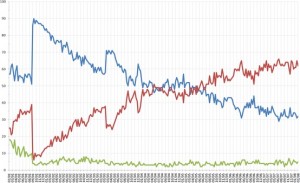Your employee engagement surveys have been completed, and the research shows that your employees are dissatisfied with their compensation levels. Should you be worried?
The good news: You’re not alone. Employees are never satisfied with what they’re paid.
The better news: It (typically) doesn’t matter.
If your company compensates its workforce at a rate that’s competitive within both your industry and region, research consistently shows that increasing compensation does little to improve employee satisfaction or performance.
While responses vary from position to position (for example, finance personnel tend to be more realistic when gauging relative compensation levels than line workers), employees usually think they should be paid more than they actually are. Thus, the majority respond negatively when surveyed about their salaries or hourly wages.
Obviously, if an employer chooses to pay below market rates, it risks increased turnover. Good workers will leave, while poor workers stay on. Plus, the talented job candidates needed to spur company growth will likely accept offers from competitors who pay better.
There are companies who choose to pay at the low end of industry pay ranges. These firms typically invest very little in employee training which offsets the cost of high turnover rates. The long-term effectiveness of this approach is debatable.
The goal is to accurately identify industry pay ranges, and set compensation levels within that range. The recommended approach is to research trade association data, instead of web-based data which often doesn’t consider regional and positional factors (such as the cost-of-living and shortages of qualified candidates), or to work with a research company like IQS Research, which often performs this type of industry research for its clients.
An exception to this approach is if your company demands a higher level of commitment from its salaried employees. For example, if your staff is expected to work a minimum of 60 hours per week while staff in comparable firms work 45 hours, salaries should be adjusted upward to reflect the increased workload.
The bottom line is that your compensation packages should be commensurate with the performance you require of each position, and competitive within your industry and region. In short, it should be at a level that attracts and retains the talent your firm needs (no less and no more). But that still doesn’t mean that your employees will give you high marks when they complete your employee engagement survey.





